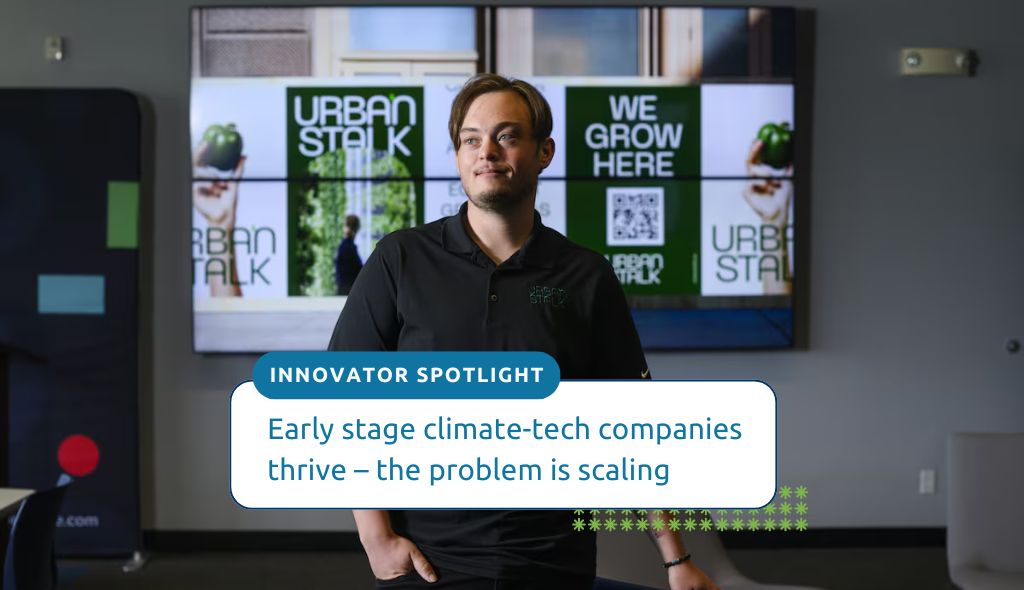Home » Early stage climate-tech companies thrive – the problem is scaling
Early stage climate-tech companies thrive – the problem is scaling

Brent Downey’s zero-waste vertical-farming startup Urban Stalk has attracted a broad base of support.
His Brant County-based business is tackling food insecurity and greenhouse gases (GHGs). Its self-contained pod system creates an optimized growing environment for more than 50 vegetables, increasing their nutritional values and reducing the cost and carbon footprint of each yield.
“It’s a fully symbiotic, circular system,” Mr. Downey says. The pods, easy to install in unused spaces such as barns or warehouses, capture CO2 and reuse plant waste, reducing water needs by 80 per cent and land use by 90 per cent.
Each pod is part of a network that shares resources, consumer tastes, preferences, and volume and turnover by region, giving the agricultural industry something traditional farming methods tend to lack: real-time, hyper-specific data.
It’s no surprise Urban Stalk has drawn funding from academic institutions, accelerators and government organizations. “Once people found out what we were doing, it had a cascade effect,” Mr. Downey says. “Lots of people have come to the table to support these types of technologies.”
Urban Stalk isn’t alone. Canada is quickly becoming a key player in early stage climate tech.
There were 13 Canadian companies on the 2024 Global Cleantech 100 list and the Boston Consultancy Group (BCG) identified Canada as a frontrunner in the ecosystem, pointing out the country has produced the third-highest number of climate startups in the past five years.
In January, Toronto-based venture capital firm ArcTern Ventures announced Canada’s biggest (in fact, one of the world’s largest) climate tech funds. The US$355-million Fund III targets companies “with the greatest potential for GHG avoidance” – especially those undergoing a Series A or B funding round.
While early stage companies are seeing a wave of support, domestic adoption of homegrown climate technologies and scale-up support is lagging.
Surviving the scale-up
Jeanette Jackson, CEO of Foresight Canada, one of Canada’s leading cleantech and climate tech accelerators, says funding has poured into climate tech since 2021, as Canada pursues a goal of reducing GHG emissions by 40 per cent by 2030.
“There still seems to be a lot of new entrepreneurs, researchers and innovators who are coming up with ideas, and I think we’re starting to see them be more market problem and data-driven,” Ms. Jackson says. “But there are some significant challenges.”
Especially when it comes to growing.
According to the BCG report, Canada trails its peers in converting startups to scale-ups with only 7 per cent of Canadian funding events over the past five years valued at more than US$50-million, versus 12 per cent in the United States.
Highwood Emissions Management (HEM), a climate tech company based in Calgary with 30 employees, has experienced first-hand the challenges of finding domestic support. The software as a service (SaaS) company has developed a tool to help the oil-and-gas industry decarbonize and meet its climate-change objectives by accurately tracking methane inventories.
The company received mentorship and financial support domestically in its early days but when it came time to raise seed funding, HEM had to look beyond Canada’s borders. “We were able to successfully raise US$3.25-million exclusively through U.S.-based funds,” says Jessica Shumlich, CEO of HEM.
She says the challenge with the seed-funding stage is you typically don’t have a product ready for the market. “We needed money before we had paying customers because we needed to build and scale that platform,” Ms. Shumlich says. When they approached U.S. venture-capital firms, they were more willing to assume the risk. “Canadian firms expected us to have those customers and revenue coming in.”
Today, HEM is working with some of the largest international oil-and-gas companies (IOCs) based in the United States and Europe but Ms. Shumlich says it still stings not having a major Canadian client.
“If we look at some of these IOCs that have committed to supporting us and guiding our software development, they say: ‘We want to be the first … we want to be a part of what you’re building…’” Ms. Shumlich explains. “Whereas if we talk to the Canadian-based oil and gas companies, they’re like, ‘well, let us know when it’s done and when someone else has trialed it and then maybe we’ll be willing to do it.’”
Ms. Jackson from Foresight Canada says the emphasis is often on funding, but like Ms. Shumlich, she sees it as an adoption problem in Canada.
“Why is it hard for us to procure our own technology?” she asks. “Just think about the opportunity to give early stage investors a quicker turnaround and ROI and how that would recycle capital into the ecosystem if we could just get adoption happening in our own country.”
She points out that the Canadian government is one of the biggest markets for these climate-tech solutions. “If we could figure [domestic procurement] out, we’d have a much more robust cleantech innovation ecosystem that stays here, builds here, exits and builds more companies here,” Ms. Jackson says. “But we have to make those things attractive.”
Innovation Factory
Innovation Factory is a business accelerator, dedicated to helping Ontario-based businesses launch, scale, and succeed. Supporting the Brant, Halton, Hamilton and Norfolk regions, we provide start-ups, and scaling companies with advisory services, training, mentorship, and strategic connections to help bring disruptive technologies to market, leverage intellectual property, increase revenues, attract investment and create jobs. Innovation can happen anywhere, our goal is to make it work everywhere. We work to elevate key industry sectors including advanced manufacturing, clean tech, information technology, smart transportation, life sciences & health care and social innovations. We are passionate about driving the growth of Ontario businesses like yours. Whether you are an entrepreneur bringing new ideas to market or a scaling business trying to get to the next level, we want to help.

